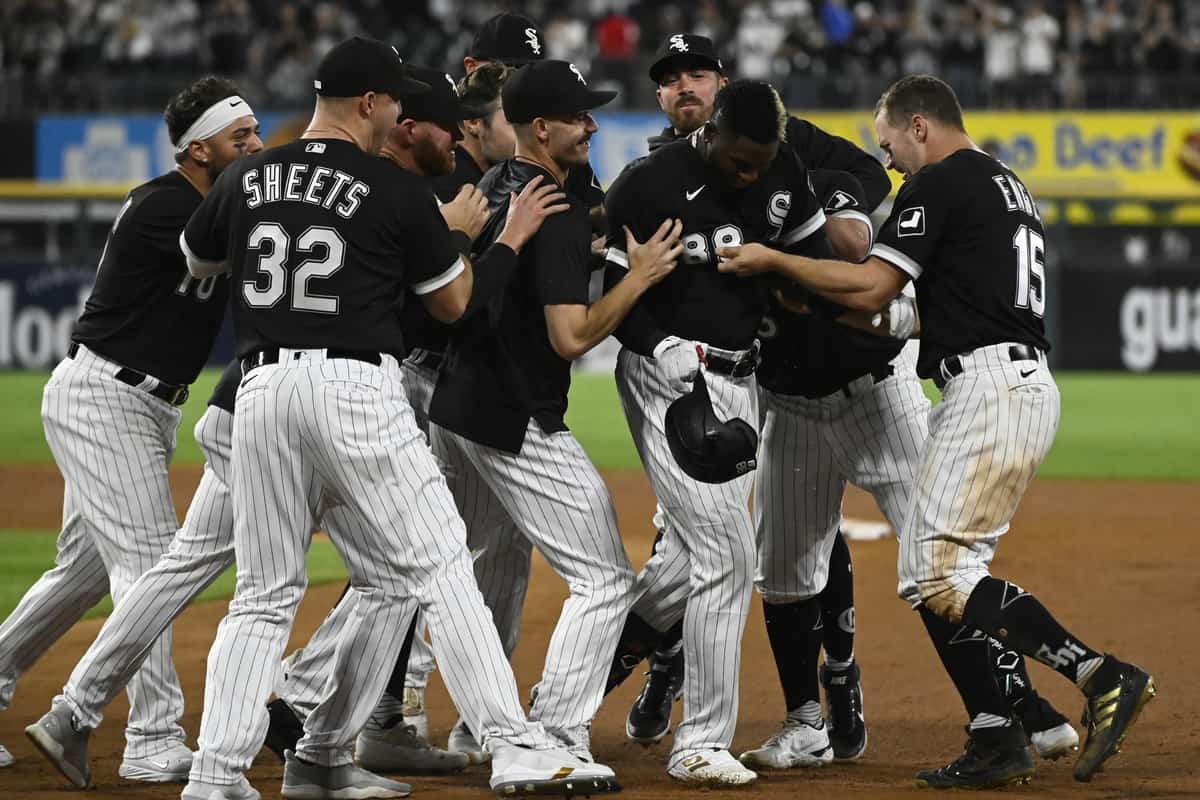The White Sox's 3-2 victory over the Yankees on Saturday night was one of those games where every decision mattered, and not simply because Luis Robert scored Tim Anderson on the penultimate bullet before extra innings.
The first two games of the series determined how much thought had to go into the third. Particularly Thursday, when Tony La Russa let Joe Kelly's control problems bury the White Sox because he didn't want to overheat a bullpen in vain. One could be more optimistic about the White Sox's chances of pulling out a victory that night after Yoán Moncada tied the game with a homer, but La Russa prioritized the long view.
Because the White Sox can't pound another team into submission, the long view pays off in a shorter time these days. On Saturday, La Russa once again confronted a situation where his most direct path to the victory required aggressive bullpen management. With a two-run lead rather than a tied game, La Russa managed proactively, aggressively, with less regard for the future.
But before we spent another post discussing reliever usage, let's talk about the earliest decision La Russa made on Saturday, because it's the one that paid off at the very end.
The lineup
Nobody particularly wanted Josh Harrison to start the ninth inning against Aroldis Chapman, but the rules demanded the ninth hitter coming to the plate to open the inning, and the Sox had no standout options on the bench against a left-handed pitcher.
What the Sox could control was who came to the plate after, and by having Tim Anderson, Yoán Moncada and Luis Robert at the top of the order before the game even started, it made such a situation possible.
The inability to pick which part of the lineup comes to the plate in a given inning is why I don't really care about particular orders, but I generally adhere to the idea that a team's best hitters should bat the most, and if front-loading the lineup is clunky for some reason (like handedness clusters downstream), then at the very least, a team should avoid slotting its worst hitters in the way.
Somewhere in the middle between those extremes is José Abreu. I'm not sure where he fits in right now, but as Chapman fell behind 3-0 to Robert, I kinda hoped that Robert would get a chance to swing the bat. Sure, it risked an inning-ending double play, whereas loading the bases for Abreu would compromise the defensive alignment in a way that stood to benefit the Sox, but Abreu just hasn't looked the part. Entering the inning, his highlight of the week was a single that snapped an 0-for-21 skid.
Given that Anderson and Robert both singled successfully by thinking opposite-field against Chapman, perhaps Abreu would've found similar success muscling something to right, but I'd hoped we wouldn't need to find out during a situation with the highest leverage possible.
Abreu's had slow starts before, but it gets harder to reflexively dismiss ugly early numbers as the weather warms. Should this continue, I'm curious about La Russa's appetite for dropping Abreu down further. It'd first require somebody to swing the bat meaningfully better than Abreu, so we're not quite there yet, but if Andrew Vaughn re-establishes himself as a threat while Gavin Sheets continues to play the part of effective platoon bat, this may be a question worth considering before the end of the month, so consider this a pre-consideration period.
Pushing pitchers
Because of all the close games the White Sox have played, the bullpen is dealing with an unusual concentration of workload concerns. Because of those workload concerns, there have been a number of games where La Russa couldn't or didn't want to manage the game in a way that maximized his best arms. It's a vicious cycle that only a better offense can break.
PERTINENT: With White Sox bullpen, it's hard to get what they paid for
The conservative approach on Thursday and the thorough blowout loss on Friday afforded La Russa an opportunity to mount his best bullpen response on Saturday, and he accepted the offer. With Kendall Graveman pitching on three days' rest for the second consecutive outing, La Russa shouldn't have thought twice about sending Graveman out for the seventh inning after an eight-pitch sixth, and Graveman answered the call with more two-seamers that made a scary Yankees lineup look silly.
Joe Kelly isn't yet one of La Russa's best arms, but he's the closest thing the White Sox have to an Aaron Bummer replacement, so he got the eighth as the Sox attempt to get him up to speed. He threw way better than he did on Thursday, but the Yankees were prepared enough for his barrage of inside sinkers to muscle them for singles, so he still found himself in a mess of trouble.
And this time, instead of leaving in Kelly batters too long, La Russa went to Liam Hendriks for a five-out save attempt instead. It didn't work, but that had more to do with Hendriks' unwillingness to throw a non-fastball than the strategy itself.
Such aggressive bullpen management could come at a cost, because La Russa may have to choose carefully if and when the White Sox find themselves in another nail-biter this afternoon. As noted before, La Russa chose to minimize pitcher usage during the opener of this series rather than burn arms while tied, which only makes sense if a better opportunity for a win arrives in short order. This was that opportunity, and it didn't pass him by.
Pulling them
Dallas Keuchel's mien doesn't bother me as much as it turns off other White Sox fans, because it probably takes a certain attitude to compete in the big leagues throwing 87. He's a little bit like Wile E. Coyote chasing the Roadrunner off the edge of a cliff -- it only becomes a problem when he stops what he's doing, so it's important to protect the ilusion.
It's just incumbent on the other decision-makers to ensure nobody else follows him off the ledge, which is what La Russa did by limiting him to five innings and 86 pitches.
Keuchel wasn't happy about it, for reasons team-oriented ...
"I mean, I'm the pitcher. My job is to go out there and throw as many as I can. I thought [86] pitches I had enough to at least go ix. With how many games we're playing, I thought I had at least 100 pitches tonight. That didn't happen. I'm not very happy with that but that's the competitor in me and we're going to have to figure out something tomorrow because we have a lot more guys down now too."
... and pride-oriented.
"I feel like my goal is to go at least six innings every start and tonight was no different. I felt like the fifth was a little bit more chaotic for the fans than it was for myself. I'm not going to be ever surprised in a situation where I'm out there. I'm always thinking. I'm always thinking ahead of what's on the field. Anybody panicking is everybody but myself."
Had he thrown worse, Keuchel might've defended any stain on the back of his pants as a tactical response, which is why I'm more inclined to laugh than to take umbrage. He has a point, in that he's located well in consecutive starts after two outings where he walked 10 batters over nine innings, so he may deserve a longer leash at some point.
Then again, Keuchel also issued multiple walks in the fifth inning, so nobody can be blamed for thinking that Keuchel was on the verge of losing it. Perhaps there will be a more obvious time to test Keuchel's mid-innings resilience, but based on the way La Russa managed the bullpen after Keuchel's portion of the evening, Saturday night was not going to be one of them.






